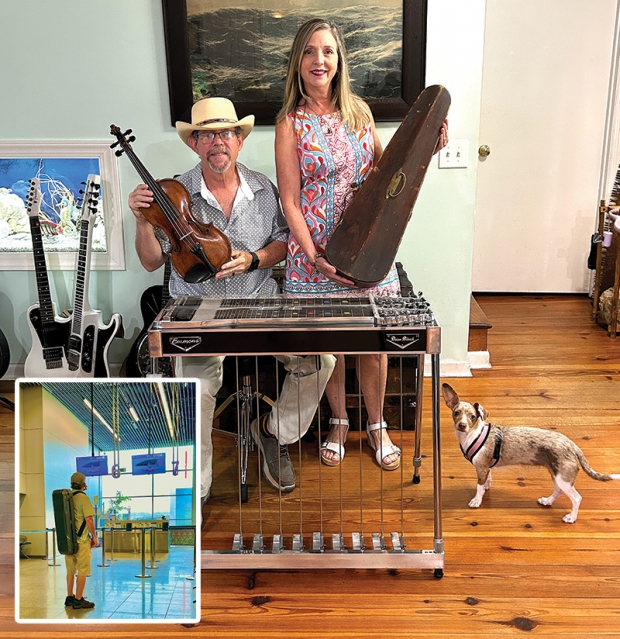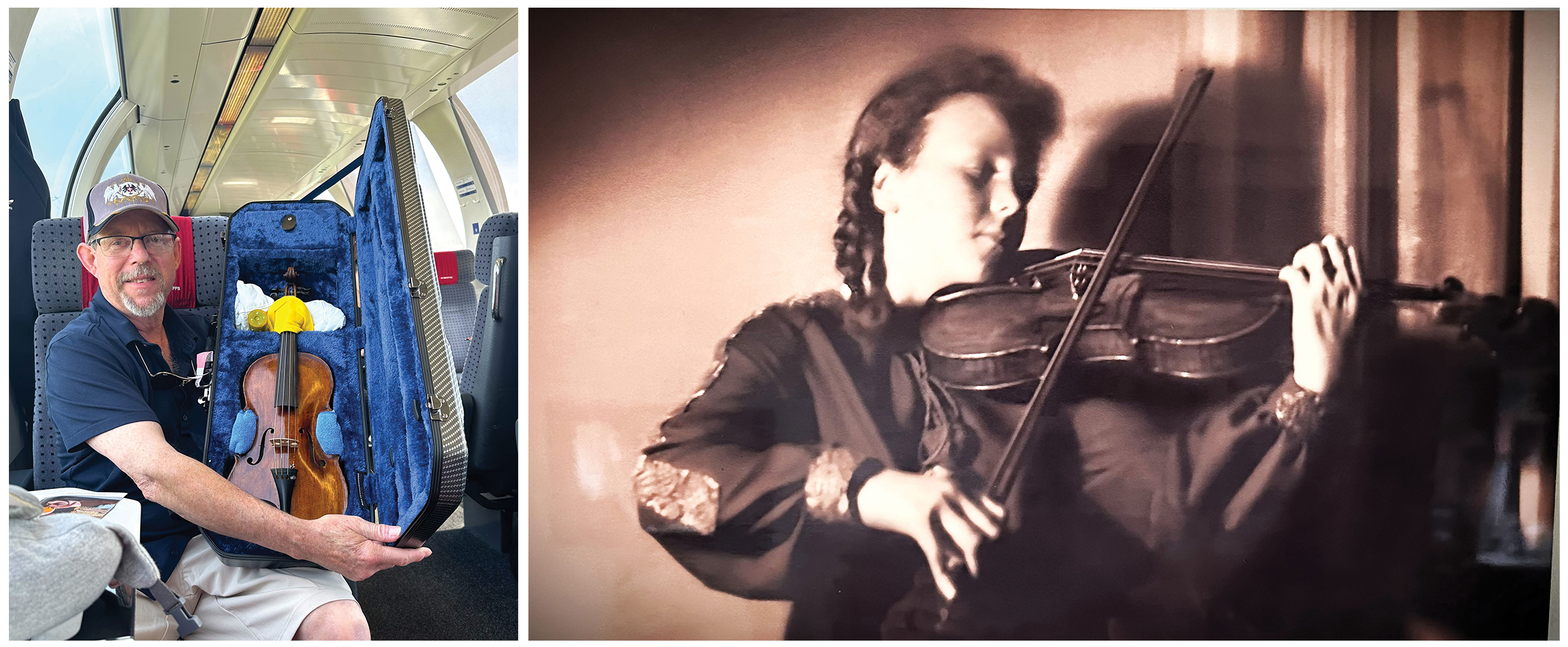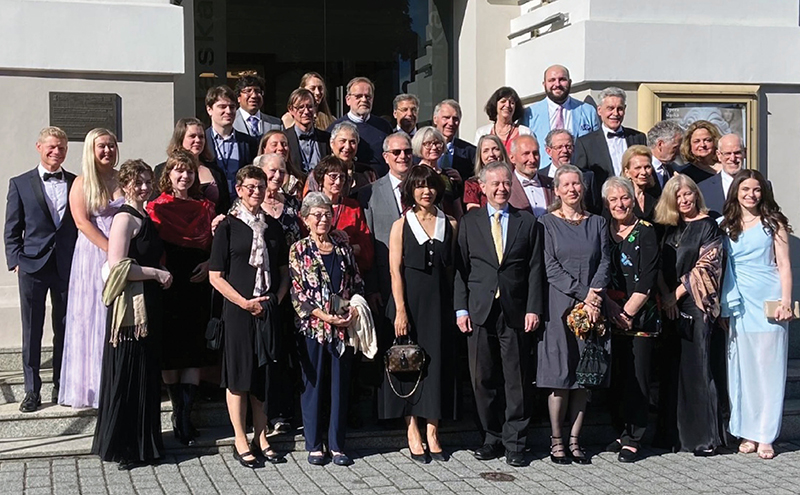Local musician Dean Black carries his great grandfather’s violin back to Poland for a grand celebration

Dean Black of Pawleys Island has learned more about his generational family history in the past 18 months than in the previous half century. In a film-worthy and truly epic tale, Black, 62, recounts the story of his great-grandfather Franz Landsberger, his great-grandmother Sabine, and of her capture and death at the hands of the Nazis. He learned more about a small town in Poland whose recognition and rededication of a famous theater built by Landsberger prompted a global family reunion and summer trip to Europe. The Black’s treasured family heirloom, a nearly 200-year-old violin played by his great-grandfather and by Dean’s mother, Eva Black, also made the return trip to Poland and was played at the very same theater the city has cherished for 125 years. As of June 16, 2024, and for the first time since WWII and Nazi occupation, the theater once again proudly displays the name “Landsberger.”
Black, an electrician and well-known musician in his own right, is part of a musical legacy dating back at least to his great-grandparents, and possibly further. Currently active in performing, Black primarily plays the pedal steel guitar, a many stringed, many levered and very complicated instrument that is a recognizable mainstay of country and pop music. He can play just about any stringed instrument put before him, except, ironically, the violin, which he tried but gave up in early childhood.
Originally from Maryland, Black eventually found his way to the Myrtle Beach area and performed at the original Legends in Concert as well as Southern Country Nights. Prior to that, he performed with a number of A-list country stars including Ronnie Milsap, and shared the bill with Kenny Chesney, Keith Urban, Brad Paisley, Tim McGraw, George Strait and many others. He comes by his musical talent honestly through DNA. His father, Ralph Black, was an author and the president of the American Symphony Orchestra League from 1973 until his passing in 1981, and his mother, Eva, was a well-known classically trained violinist performing first with the Buffalo Philharmonic where she was one of only five women. She later toured with the National Ballet Orchestra, The National Symphony, and spent the longest run, some 30-plus years, performing for The Kennedy Center Orchestra. She played her grandfather’s instrument off and on throughout her long career and Black inherited it at her passing.

“The violin first belonged to my great grandfather,” says Black, who lives in a quiet, beautifully wooded Pawleys Island neighborhood with his wife, Terri Black, who accompanied him on the adventure. Their beloved mixed breed dog, Ruby, stayed home, but with the couple’s recent return, Ruby seems to have forgiven them for their travel transgressions.
Black had a Charleston-based luthier check out the instrument who found it to be in good working order before the trip to Poland. Black treats his great- grandfather’s violin as an extension of the man himself, who once played it as part of trios and quartets in the theater and around Beuthen, Germany, more than 100 years earlier.
“Apparently he was a mover and shaker in the city,” says Black, who would learn many more details about his great grandparents. Black learned that Landsberger was also an entrepreneur, director of a large bank, a financer, and design consultant behind the theater’s original funding and construction. The Beuthen Municipal Theater, now called the Silesian Opera House (or Opera Slaska), opened to great fanfare in 1900. In 1925, Landsberger died suddenly, just as the growing war clouds over Europe, still recovering from WWI, were again threatening the region with the German government passing the first of its Nazi antisemitic legislation as early as 1933.
“My great grandfather and great grandmother — she later died in the Holocaust — lived in the border town of Beuthen, Germany, which became Bytom, Poland in 1945,” says Black. The borders were changed after the Potsdam Conference of 1945 when the Soviet Union expelled most of the German population.
“In 2016, a group of folks, most of whom are Landsberger descendants, started contacting as many of the other descendants as they could find to let us know what was happening,” recalls Black, with the help of Terri, who confirms or challenges his recollection of the complicated story.
“It really snowballed when [Isabella Wojcik-Kuhnel] wrote a book about my grandfather and the theater he helped build.” The book was released in German and Polish and will be released in English by the end of this year. “Once the book was published, the City of Bytom got interested, the press was interested, and things really started moving along.”
“I knew very little of this story, even of my Jewish heritage, until maybe a year ago,” says Black. “My mother never spoke of it, nor did my grandfather, Max Landsberger.”
Black’s older siblings first started getting details of the family history through a series of video calls around 2016 from a few of their great grandfather’s descendants, their distant cousins, who were scattered around the globe.
“There was growing interest in rededicating the theater and to reinstall a plaque honoring my great grandfather,” recalls Black. “The first bronze plaque was removed by the Nazis because of his Jewish heritage.”
Black would later learn that his great-grandfather died of natural causes in 1925 and his great-grandmother emigrated to Amsterdam in 1937, the same point where Jewish ghettos were formed. The infamous Jewish star was a required accessory for all Jews living in Germany. Sabine Landsberger, Black’s great-grandmother, was captured at the age of 82 and died at the hands of the Nazis either in the Sobibor death camp or en-route; Black says the history is unclear.
“My great grandmother’s name is listed on a Holocaust memorial at the Dutch Museum in Amsterdam as one of the many thousands of people murdered when the Nazis invaded and occupied the Netherlands,” Black continues, somber and reflective.
Black’s grandmother survived the war but died in Europe as a young woman, and his grandfather and mother immigrated to the U.S. while his mother was still a young child; they settled in Bethesda, Maryland.
“I started on the violin around seven years old,” recalls Black, “but then hearing rock ‘n’ roll for the first time, I changed my musical leanings. “Plus, you’re not going to meet any chicks playing the classical violin,” he adds with a chuckle. “I got an electric guitar, my older siblings were listening to the Beatles and the Stones, and they took me to see The New Riders of the Purple Sage (Panama Red), a country-rock act, and I heard Buddy Cage on pedal steel for the first time. He was in his prime and I thought, that’s the instrument for me. I was 12 years old. Dad wasn’t keen on me being a professional musician, but mom was supportive. She bought me my first pedal steel and drove me to my lessons around the D.C. Beltway once a week for years.”

Terri Black, a lifelong native of the South Strand, is currently a licensed esthetician but also enjoyed a 30-year career as an executive assistant for an accounting firm. She has two children from a previous marriage that live in the area and the couple have been married for 15 years.
“The trip was absolutely amazing,” she recalls. “We’d been to Europe before, but this was something very special.”
After more than a year of planning, the trip’s details were coming into focus. There would be a rededication and series of concert events in June 2024, and Franz Landsberger’s violin would be played, once again filling the hall with sweet sounds echoing from 125 years earlier. Black bought a special carbon-fiber travel case for the instrument and wore it on his back through three European countries, Hungary, Austria and Poland. He had checked and double checked with the airlines that he’d be able to treat it as a carry-on, while Terri saw to other travel details. She treated herself by purchasing a vintage gown in anticipation of the upcoming events.
Finally, the tickets were booked, and the journey began.
Upon their eventual arrival in Poland, the Blacks were greeted by the Landsberger descendants, some 42 of them. They would come for the celebration from Alaska, Australia, the U.S. and throughout Europe. They gathered along with the staff and musicians of the theater for a family reunion, a celebration to make other reunions pale in comparison. The opera company would stage a fully costumed full production of Don Giovani, along with other performances. The City’s dignitaries attended, and the theater enjoyed sold-out crowds. The press, local and national, covered the event as the new Franz Landsberger plaque was unveiled; it was identical to the one destroyed by the Nazis 85 years ago.

“At the unveiling ceremony, the first chair violinist Agata Guzy played my great grandfather’s violin after seeing it and holding it for the first time just moments earlier – a lot of them didn’t know I was bringing this violin. It was played again at the book release, and for the opera.”
“The city really rolled out the red carpet for us,” recalls Black, who said the celebration was muted slightly by the current difficulties in Eastern Europe and the Bytom area. “There’s a lot of poverty; Poland borders the Ukraine and they’re worried about the war expanding and unemployment. The former socialist government’s factories were mostly closed, lots of people were out of work. So many people we saw walking around Bytom never seemed to smile – like they were all in survival mode. Here’s this ornate, almost opulent theater, the crown jewel of the city, 125 years old, in the midst of their hardships.”
Still, the show must go on, even under bleak circumstances. The 125-year history of the theater, the opera company who’s called it home since 1945, and the Landsberger name had its dedicated fans who, Black says, were more than enthusiastic about the theater’s renovations and rededication. Few of them probably knew the history of Landsberger’s violin, of the family’s long, interesting and sometimes tragic history, and of a pedal steel player from Pawleys Island who proudly carries on the tradition of those musicians who came befoe him.
Images courtesy of Dean Black; Terri Black; Paul Grimshaw; Wikipedia Media; Shutterstock; Wiki Commons; Wikimedia